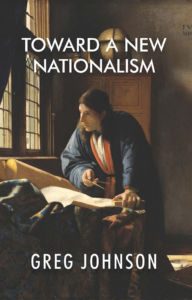A Manifesto for Gamergate II
Posted By David M. Zsutty On In North American New Right | 2 CommentsGamergate can be summarized as the backlash against Social Justice Warrior (SJW) themes that were being pushed in video games during 2014-2015. The reader may explore the deep lore surrounding it if he is so inclined, for those days have passed into legend.
A second Gamergate has begun, although it is more limited in scope — for now. The focus is on Sweet Baby Inc., a company that offers “diversity consulting” for video-game scripts, and which has been blamed for a rising number of woke video games. One can endlessly debate exactly what “woke” means, but a useful working definition is anti-white and/or pro-degeneracy.
I doubt that anyone believes that the trend of woke video games is limited to or even substantially driven by Sweet Baby Inc., just as wokeness in the judiciary is not limited to George Soros funding woke prosecutors. Wokeness is a deeper problem stemming from the way in which entire fields have fallen to Jewish control and influence.
Focusing our ire against Sweet Baby Inc. appears to follow Saul Alinsky’s advice in Rules for Radicals [2] to isolate, personalize, and polarize a target. The Left does not like to be given even a small taste of their own medicine and have been complaining endlessly about it. This is rather ironic given that woke SJWs are generally sympathetic to antifa, which makes extensive use of doxing to harass their political enemies. Watching Leftists have meltdowns when they are given even a small taste of the criticism they love to dole out is pure Schadenfreude. Supposed white fragility has nothing on SJW fragility.
We can certainly adapt Alinsky’s tactics to our own politics, but there are limitations. His tactics worked in large part because he was attacking conservatives who are cowardly, defensive, naïve, sensible, and individualistic. They essentially allowed Alinsky to destroy them piecemeal. Having a sympathetic media also helped. Using such tactics against the Left can certainly yield results, but they will be limited given that the Left is aggressive, self-righteous to the point of hysteria, fanatical, and most of all, unified.
A better tactic for Gamergate II is the economic equivalent of a strategic bombing of the studios that produce AAA games (i.e., those that produce high-budget, high-profile games). Aside from a few foreign and small independent publishers, they are all saturated in wokeness. There is no innocence in the gaming industry; only varying degrees of guilt.
Now is the perfect time for another Gamergate because we can ride the energy of the 2024 election, just as the Alt Right capitalized on the energy of Trump’s first presidential run. Triggering the liberals on social media is good, but inflicting economic pain is even better. Further, a mass boycott is both viable and justified.
The first poll [3] conducted by the Homeland Institute in August of 2023 found that 29.1% of all respondents said that they would follow through with boycotting a business that is accused of being woke if they had to pay 10% more or drive an extra mile. The respondents were all white voters. A boycott’s effectiveness depends on a variety of factors, such as the target’s profit margins and its customer base. Given that the average gamer is more likely to be white, male, young, and Right-wing than the general population, there is a strong potential for video-game boycotts. For example, a 2015 poll by the Entertainment Software Association found that 48% of gamers were conservative and 38% were liberals. While that poll is nearly a decade old, and the player base has become substantially more diverse since that time, there is still a strong and cohesive cohort that resembles the classic white male gamer who at leans at least slightly to the Right in his politics.
It should be noted that video games encompass various genres, each of which have different player bases. Casual mobile games, grand strategy map games such as Hearts of Iron and Sid Meyer’s Civilization, first-person shooter games such as Call of Duty, and epic fantasy and science fiction role-playing games (RPGs) such as Baldur’s Gate all attract very different players.
There can be great variance within genres as well. Diablo 4 and Path of Exile, for example, are both action RPGs, but the former is superficial in its level of challenge, gameplay, and story, while it is joked that the latter requires a doctorate to play due to its complicated mechanics. Generally, the more complex and deep a game is, the more its player base will resemble the classic gamer, and those games are most vulnerable to boycott.
Boycotts usually require consumers to forego a good or service entirely, which usually entails spending more time or money on an alternative. But a mass boycott of woke games would be easier than most other boycotts. First, almost all games are downloaded from the Internet now with a click of a button, so there’s no travel cost if one wants to shop for alternatives. It is also easy to research whether a game is woke or otherwise lacks quality once player reviews start to come out.
Second, little to nothing of value is lost by boycotting woke games. They are usually of low quality because the SJWs and diversity tokens who design them lack skill and imagination. The saga of Blizzard Entertainment, which is famous for its massive, multiplayer, online RPG World of Warcraft as well as the Diablo series illustrates this perfectly. A common saying is, “In my childhood Blizzard couldn’t get it wrong, but in my adulthood they can’t get it right.”
 [4]
[4]You can buy Greg Johnson’s Toward a New Nationalism here [5].
The number of AAA games that have failed to attract much interest is large and only growing. Part of this is because their designers spend too much of their budget on marketing and overly fancy graphics, which eventually become superfluous and cannot compensate for a bad story or gameplay. I’d rather they spent their budgets making good products rather than telling me that their bad products are good. Besides which, high-definition sun shafts can be enjoyed at the local park for free.
Cyberpunk 2077, Battlefield V (which has been written about [6] for Counter-Currents by American Krogan), and Starfield all had expensive marketing campaigns, unnecessarily fancy graphics, poor gameplay, and on release were infested with more bugs than a rotting redwood tree. They also just so happened to all be extremely woke. Contrast this with Elden Ring from the Japanese-owned Dark Souls franchise, which despite being a AAA game was high-quality and devoid of wokeness. There is a strong inverse correlation between quality and wokeness in the video-game industry, so we aren’t really foregoing any real benefit by boycotting them.
Aggressively boycotting woke video games is ironically more to our benefit than detriment. Many of these woke games come with a hefty price tag while demanding large time investments that could be better spent on older games with high replay value, such as the older Elder Scrolls series, or games which are lovingly crafted by independent studios, such as The Great Rebellion from KVLTGAMES. While The Great Rebellion is openly political, even apolitical independent studios frequently outperform AAA studios that are just in it for the money, or to push their SJW agenda.
Furthermore, many games have free mods that have been designed by a fan base that passionately cares about the game as an art in itself. For example, the official downloadable content (dlc) for Hearts of Iron 4, which one must pay for, is a hit-or-miss affair — and more of a miss. The developers are frequently outshone by free fan mods such as Kaiserreich, Road to 56, The New Order, and Millenium Dawn. Funding the modders who create true art while demanding nothing in return rather than indulging in endless dlc cash grabs by its original developers is both moral and rational.
It may be wise to refrain from buying games immediately on release — not only because they are usually a buggy, unplayable mess for about a week until the first patch, but also to see if the player reviews mention any woke themes. Wokeness is usually up front and blatant, but is sometimes subtler. Pre-ordering anything from all but the most reliable studios should be out of the question, as pre-orders too often function as cash grabs which then fail to deliver.
In fact, I would consider many of the AAA flops to be de facto anti-woke boycotts. Even if gamers refuse woke games because of their low quality rather than their political content, both stem from the same underlying causes. For example, Cyberpunk’s rampant degeneracy was so eclipsed by its abysmal quality that the studio failed to make even a slim profit from it until the autumn of 2023 [7], almost three years after its release in December of 2020.
We gamers should be proud, because we have higher standards, more self-respect, and more self-control than the sportsball crowd. For example, despite dishing out the same implicitly — and even explicitly — anti-white, degenerate slop year after year, the National Football League (NFL) and the Super Bowl have only seen rising profits [8]. The dip in the NFL’s 2020 profits was probably only due to COVID and not a backlash against Black Lives Matter, because they immediately rebounded in 2021. While the NFL’s consumer base is substantially more ordinary, liberal, and non-white than those of most video games, there are still plenty of white sportsball fans that the NFL depends on. Why should the NFL back off from its anti-white positions if white fans fail to impose even slight opportunity costs on them? Along with being proud, we gamers should be confident that we can launch anti-white boycotts simply because we know how to say the word “No.”
Remember that every diversity hire is also a diversity fire. Every obese, non-binary woman who looks like an avatar of Nurgle took the place of a white man who would have made a better product. Ungracious woke publishers deny our people an opportunity to make good games as much as they deny us an opportunity to enjoy good games. For example, Bethesda Game Studios canceled the famous composer Jeremy Soule because he was #metooed with frivolous allegations. Given that much of a game’s artistic quality stems from its atmosphere, Soule’s music made many games, such as Oblivion and Guild Wars, what they are. I will always remember how they made me feel, even though I have forgotten most of the particular details.
If Bethesda wants to cancel Jeremy Soule, then we should cancel Bethesda — both in solidarity with Soule as a white man and a true gamer, and because their future games will not be worth our time and money. The next studio who picks him up will fully deserve the profits they will reap, as well as the glory that comes from creating genuine art.
Bethesda is a microcosm of woke Leftists who take over institutions and then wear their legacy as a skin suit while demanding that we continue to pay tribute to them. Bethesda is a completely different company with an entirely different staff. They should not be allowed to rest on the laurels of past games, especially when they cancel those who made those games special.
We should adopt a zero-tolerance policy of wokeness in AAA games until such time as the industry either submits or is destroyed. This is justified, rational, feasible, and to our benefit. It will be especially beneficial if it paves the way for smaller studios to surpass the woke mega-corps.
Skyrim is for the gamers!
